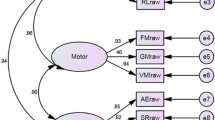Abstract
The purpose of this study was to examine the reliability and validity of the Chinese version of the Psycho-educational Profile-Revised (PEP-R). The Chinese PEP-R (CPEP-R) was administered to 63 preschool children with symptoms of autistic disorder recruited from special child-care centers in Hong Kong. Results showed that the scales of the CPEP-R were internally consistent, reliable across raters and temporally stable. Regarding the concurrent validity of the CPEP-R, the developmental score and developmental age assessed by the CPEP-R were significantly correlated with the Merrill–Palmer Scale of Mental Tests and the Hong Kong Based Adaptive Behavior Scale. The Behavioral Scale of the CPEP-R was also significantly related to the Childhood Autism Rating Scale. Besides replicating the findings in the Western context, the present study suggests that the psychometric properties of the PEP-R are stable across cultures and the related findings support the cross-cultural reliability of the tool.
Similar content being viewed by others
References
InstitutionalAuthorNameAmerican Psychiatric Association (1994) Diagnostic and statistical manual of mental disorder EditionNumber4th ed. Author Washington, DC
G. D. Alpern (1967) ArticleTitleMeasurement of “untestable” autistic children Journal of Abnormal Psychology 72 478–496
L. J. Cronbach (1951) ArticleTitleCoefficient alpha and the internal structure of tests Psychometrika 16 297–334
InstitutionalAuthorNameDepartment of Health (1995) Report on the findings of a local study on the Merrill-Palmer Scale of Mental Tests Child Assessment Service, Department of Health, Government of Hong Kong Hong Kong
R. DeVellis (1991) Scale development Sage Newbury Park, CA
J. P. Guilford B. Fruchter (1978) Fundamental statistics in psychology and education McGraw-Hill New York
J. E. Gillham A. S. Carter F. R. Volkmar S. S. Sparrow (2000) ArticleTitleToward a developmental operational definition of autism Journal of Autism and Developmental Disorders 30 269–278
D. P. Hartmann (1977) ArticleTitleConsiderations in the choice of inter-observer reliability estimates Journal of Applied Behavior Analysis 10 103–116
InstitutionalAuthorNameHealth and Welfare Bureau (1994) Report by the Working Group on Services for Autistic Persons Health and Welfare Bureau, Government of Hong Kong Hong Kong
InstitutionalAuthorNameHealth and Welfare Bureau (1995) Report on Overseas Study Visit on Autism Health and Welfare Bureau, Government of Hong Kong Hong Kong
J. Kwok D. T. L. Shek J. Tse S. Chan (1989) Hong Kong Based Adaptive Behavior Scale Department of Applied Social Studies, City Polytechnic of Hong Kong Hong Kong
M. K. T. Lam N. Rao (1993) ArticleTitleDeveloping a Chinese version of the Psychoeducational Profile (CPEP) to assess autistic children in Hong Kong Journal of Autism and Developmental Disorders 23 273–279
P. Muris P. Steerneman E. Ratering (1997) ArticleTitleBrief report: Interrater reliability of the Psychoeducational Profile (PEP) Journal of Autism and Developmental Disorders 27 621–626
S. L. Parks (1988) Psychometric instruments available for the assessment of autistic children E. Schopler G. B. Mesibov (Eds) Diagnosis and assessment in autism Plenum New York 123–136
M. Rutter (1978) Language disorder and infantile autism M. Rutter E. Schopler (Eds) Autism: A reappraisal of concepts and treatment Plenum New York 85–104
E. Schopler (1997) Implementation of TEACCH philosophy D. J. Cohen F. R. Volkmar (Eds) Handbook of autism and pervasive developmental disorders Wiley New York 767–795
E. Schopler R. J. Reichler (1979) Individualized assessment and treatment for autistic and developmentally disabled children (Vol. 1): Psychoeducational Profile Pro-Ed Austin, TX
E. Schopler R. J. Reichler A. Bashford M. Lansing L. Marcus (1990) Individualized assessment and treatment for autistic and developmentally disabled children (Vol. 1): Psychoeducational Profile-Revised (PEP-R) Pro-Ed Austin, TX
E. Schopler R. J. Reichler R. F. DeVellis K. Daly (1980) ArticleTitleTowards objective classification of childhood autism: Childhood Autism Rating Scale (CARS) Journal of Autism and Developmental Disorders, 11 201–217
E. Schopler R. J. Reichler B. R. Renner (1988) The Childhood Autism Rating Scale (CARS) Western Psychological Services Los Angeles, CA
D. T. L. Shek (1998) ArticleTitleThe Chinese version of the Self-Report Family Inventory: Does culture make a difference? Research on Social Work Practice 8 315–329
D. T. L. Shek (2001a) ArticleTitlePsychometric properties of the Chinese version of the Self-Report Family Inventory: Findings based on a longitudinal study Research on Social Work Practice 11 485–502
D. T. L. Shek (2001b) ArticleTitleThe General Functioning Scale of the Family Assessment Device: Does it work in the Chinese culture? Journal of Clinical Psychology 57 1503–1516
D. T. L. Shek K. Lai (2001) ArticleTitleThe Chinese version of the Self-Report Family Inventory: Reliability and validity American Journal of Family Therapy 29 207–220
P. E. Shrout J. L. Fleiss (1979) ArticleTitleIntra-class correlations: Uses in assessing rater reliability Psychological Bulletin 86 420–428
S. S. Sparrow D. Balla D. V. Cicchetti (1984) Vineland Adaptive Behavior Scales American Guidance Services Circle Pines, MN
P. Steerneman P. Muris H. Merckelbach H. Willems (1997) ArticleTitleBrief report: Assessment of developmental and abnormal behavior in children with pervasive developmental disorders: Evidence for the reliability and validity of the Revised Psychoeducational Profile Journal of Autism and Development Disorders 27 177–185
R. Stutsman (1948) Merrill-Palmer Scale of Mental Tests Western Psychological Services Los Angeles, CA
Tang L. Y. (2000). Reliability and validity of Psychoeducational Profile-Revised (Chinese Version). Unpublished Master of Science (Health Care) dissertation. Hong Kong: Department of Rehabilitation Science, The Hong Kong Polytechnic University
I. Berckelaer-Onnes ParticleVan G. Duijn ParticleVan (1993) ArticleTitleA comparison between the handicaps behavior and skills schedule and the Psychoeducational Profile Journal of Autism and Developmental Disorders 23 263–272
F. Volkmar L. Hoder D. Cohen (1985) ArticleTitleCompliance, ‘negativism’ and the effects of treatment and structure in autism: A naturalistic behavior study Journal of Child Psychology and Psychiatry 26 865–877
Author information
Authors and Affiliations
Corresponding author
Rights and permissions
About this article
Cite this article
Shek, D.T.L., Tsang, S.K.M., Lam, L.L. et al. Psychometric Properties of the Chinese Version of the Psycho-educational Profile-Revised (CPEP-R). J Autism Dev Disord 35, 37–44 (2005). https://doi.org/10.1007/s10803-004-1029-3
Issue Date:
DOI: https://doi.org/10.1007/s10803-004-1029-3




